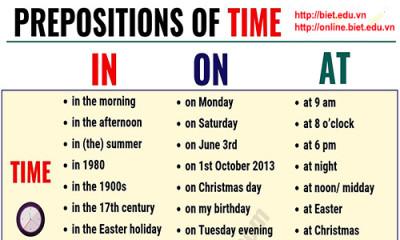

In your sentences, on is the correct preposition and in is the incorrect one. This is a bit tricky.
Bạn đang xem: Prepositions
"He passed away on March 5" is correct. "He passed away in the morning" is also correct. However, in your sentence, "the morning" is a characteristic possessed by March 5, "March 5"s morning," as it were. (Note that we would never say "March 5"s morning"; I"m just using it to lớn help illustrate that we"re using a size of the possessive here). So, "He passed away on the morning of March 5" is correct.
If we turn things around a bit it may help lớn make things a bit more clear: since "he passed away on March 5 in the morning" is correct, it follows that "he passed away in the morning on March 5" is also correct.
A couple of additional observations:
He passed away some time in the three hours prior to Joe"s arrival.He passed away at 10 am on March 5.
giới thiệu
Improve this answer
Follow
edited Oct 23, 2022 at 15:59
answered Mar 10, 2014 at 14:59

Bob
Rodes
Bob
Rodes
14.9k2525 silver badges4040 bronze badges
4
địa chỉ a comment |
8
You say "in the morning/in the afternoon/in the evening". These indications of time stand alone & the concept is in + period of time.
It is another thing for "on the morning of the first of May". Here the concept of date/on this day prevails and has become the accepted expression.
nội dung
Improve this answer
Follow
edited Dec 4, năm trước at 14:24

jimsug
4,05011 gold badge2020 silver badges3131 bronze badges
answered Oct 27, năm trước at 19:17

rogermuerogermue
8,46822 gold badges2222 silver badges2424 bronze badges
địa chỉ a bình luận |
3
Well, it seems none of the answers explain why is it like that, what are the rules, what"s the usage, and no-one provided references. I will elaborate & will post my investigation, as I did here at ELU.
Xem thêm: Ghép nối ký tự với hàm ghép chữ và số trong excel cực hữu ích
Just to cut the long story short, for this specific case: "on" is the correct preposition and "in" is the incorrect one.
"The morning of" functions as an adjectival phrase clarifying the specific time and date "on March 5". "On" is used because it belongs khổng lồ the date here, specific part of the day.
The normal language constructions would be:
on + date (with the year or without it) or day of the weekin + morning, afternoon, evening (in the morning, in the evening)But, when we talk about a specific morning, afternoon, or when we describe the part of the day it should be used with on:
on the morning ofYou can"t say "I will see you on the morning" - it"s incorrect.
here"s the reference for more examples: http://dictionary.cambridge.org/grammar/british-grammar/at-on-and-in-time
In or on?
We use in with morning, afternoon, evening và night, but we use on when we talk about a specific morning, afternoon, etc., or when we describe the part of the day.

Hi everyone! Today we learn how to use time prepositions At, On và In. (Xin chào đầy đủ người! Hôm nay, họ học làm cách nào để cần sử dụng giới từ bỏ chỉ thời hạn At, On với In)
We use At for clock time, exact times of day, night or holiday periods. (Chúng ta sử dụng At mang đến giờ trên mặt đồng hồ, thời gian chính xác của ngày, đêm hay những kỳ du lịch lễ)For example, we can say (Ví dụ như, chúng ta cũng có thể nói) at 6 o’clock (lúc 6 giờ), at noon (vào buổi trưa), at night (vào ban đêm), at midnight (vào nửa đêm), at sunrise (lúc khía cạnh trời mọc), at sunset (lúc hoàng hôn), at dawn (lúc bình minh).

And we use On for weekdays, dates, holidays, weekends or days going with morning, afternoon và evening. (Và chúng ta dùng On cho một ngày trong tuần, ngày tháng, ngày lễ, vào buổi tối cuối tuần hoặc rất nhiều ngày kèm theo với Sáng, Chiều, Tối). For example, we can say (Ví dụ như, bạn có thể nói) on Tuesday (Vào thiết bị Ba), on 26th (vào ngày 26), on Christmas Eve (vào tối Giáng sinh), on Christmas Day (vào đợt nghỉ lễ Giáng sinh), on the weekend (vào cuối tuần), on weekends (vào phần đông cuối tuần), on Thanksgiving (vào lễ tạ ơn), on Friday mornings (vào những sáng vật dụng Sáu), on the first day of … (vào ngày trước tiên của …).
And we use In for months, years, seasons, morning, afternoon, evening, centuries & eras, … (Chúng ta cần sử dụng In cho những tháng, các năm, các mùa, sáng, chiều, tối, cầm kỷ cùng kỷ nguyên, …).For example, we can say (Ví dụ như, bạn cũng có thể nói) in August (vào tháng tám), in the morning (vào buổi sáng), in the afternoon (vào buổi chiều), in the evening (vào buổi tối), in the summer (vào mùa hè), in the 70’s (vào thập niên 70), in the 14th century (vào rứa kỷ máy 14),
And now below is the exercise for you (Và bây giờ dưới đó là bài tập giành cho bạn)Please fill in the blanks with time prepositions At, On và In! (Vui lòng điền vào khu vực trống với giới tự chỉ thời gian At, On cùng In!)I hope you can bởi vì them very well (Tôi hy vọng bạn có thể làm điều đó rất tốt)If you cannot vày that, please check the answers! (Nếu chúng ta không thể có tác dụng điều đó, vui miệng kiểm tra câu trả lời!)
If you would like to study more, please join our class at 50 Nguyen Khuyen Street – Vĩnh hai Ward – Nha Trang thành phố – Khanh Hoa Province! (Nếu bạn muốn học thêm, vui lòng tham gia lớp học tập của shop chúng tôi tại 50 Nguyễn Khuyến – Phường Vĩnh Hải – tp Nha Trang – tỉnh Khánh Hòa!)And the phone number is 0258 3833 207 (Và số điện thoại là 0258 3833 207)
Thank you for listening. See you next time. Bye bye! (Cám ơn các bạn đã lắng nghe. Hẹn chạm chán lại chúng ta lần sau. Xin trợ thời biệt!)















